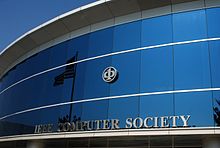IEEE Computer Society
The IEEE Computer Society is an organizational part of the IEEE . It was founded in 1963 when the American Institute of Electrical Engineers (AIEE) and the Institute of Radio Engineers (IRE) merged to create the IEEE. At the time of the merger, the AIEE's Large-Scale Computing Sub- Committee (founded in 1946) was merged with the IRE's Technical Committee for Electronic Computers (founded in 1948) to initially form the IEEE Computer Group . This group became the IEEE Computer Society in 1971 .

Position in the IEEE
In the structure of the IEEE, the Computer Society is one of nearly 40 technical societies that are organized under the Technical Activities Board of the IEEE. Because of its size (about 100,000 members and employees in 2004) and the scope of its activities, the Computer Society enjoys an outstanding status. It provides two voting members of the 31 IEEE Board of Directors , is represented on the IEEE Executive Committee , and operates many of its publications, conferences and recruitment activities with a greater degree of autonomy than other societies and organizational units within the IEEE.
Main activities
With administrative centers in Washington, DC (and additional offices in California and Japan ), the Computer Society directs the publication of 14 periodicals (including the Society’s leading publication Computers and IEEE Software ) and 14 professional journals. The journals are mainly known as "Transactions" (e.g. the IEEE Transactions on Computers and IEEE Transactions on Software Engineering ). Two of these transactions are published jointly with the Association for Computing Machinery . The society organizes about 150 conferences annually and has nearly 200 local departments worldwide. It coordinates the activities of around 50 technical committees (technical committees, e.g. for bioinformatics ), councils (councils, e.g. council for software engineering ) and task forces (problem groups, e.g. for information security ). The company participates in training activities (including "distance learning") and in accreditations of advanced training programs in their fields of interest (such as computer science and computer engineering). It runs around a dozen working groups and committees for the development of industrial standards (e.g. the Storage Systems Standards Committee ).
Relationship to other professional associations
The IEEE Computer Society competes with professional associations in the general fields of computer science and information technology . Traditionally, society has been more successful in attracting engineers (particularly electrical and computer engineering) than those with degrees in computer science or information technology.
On the computer science side, the most important organization outside of the IEEE is the Association for Computing Machinery (ACM). The ACM has about 80,000 members (2004) and cooperates with the Computer Society in several joint publications and conferences.
In the information technology field, the IEEE projects compete through various commercial trade shows as well as some popular publications, mainly online. Some of these publications are more application and commercial device oriented than the more science oriented IEEE journals. The IEEE Computer Society also faces internal competition from other societies within the IEEE whose area of interest overlaps that of the Computer Society.
Awards from the IEEE Computer Society
The IEEE Computer Society recognizes outstanding work by computer specialists who advance the field through outstanding technical achievements and through services to the profession and to society. Awards are given in the following categories: Technical Awards , Education Awards , Service Awards, and Golden Core Awards .
They award the Computer Pioneer Award and the Seymour Cray Computer Engineering Award .
Selected publications
- computer
- IEEE Micro
- IEEE software
- IEEE Transactions on Computers
- IEEE Transactions on Pattern Analysis and Machine Intelligence
- IEEE Transactions on Software Engineering
Web links
- For more information on the IEEE Computer Society, see www.computer.org .
- For more information on the IEEE Computer Society awards, see the IEEE Computer Society Award List .
- An interview with Charles Concordia .